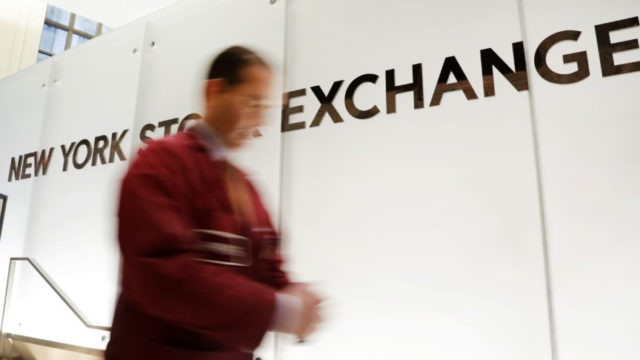NEW YORK (AP) — U.S. stock indexes fell on Monday after losses for technology companies overshadowed gains for energy producers and elsewhere.
KEEPING SCORE: The Standard & Poor’s 500 index dropped 9 points, or 0.4 percent, to 2,493, as of noon. Eastern time. The Dow Jones industrial average fell 78 points, or 0.4 percent, to 22,270, and the Nasdaq composite dropped 65, or 1 percent, to 6,362.
Slightly more stocks rose on the New York Stock Exchange than fell.
TECH TURBULENCE: Tech stocks in the S&P 500 lost 1.6 percent, the steepest drop among the 11 sectors that make up the index. Losses were broad across the sector: Facebook fell 3.8 percent, chipmaker Nvidia lost 3.7 percent and video-game developer Electronic Arts lost 3.4 percent.
ENERGIZED: The price of benchmark U.S. crude oil rose $1.03, or 2 percent, to $51.69 per barrel. Brent crude, the international standard, gained $1.34 to $57.76 per barrel.
The higher prices helped lift stocks across the energy sector, which rose 1.3 percent. Marathon Oil gained 2.6 percent, and Noble Energy rose 2.7 percent.
REVVED UP: Genuine Parts jumped to the biggest gain in the S&P 500 after it said it would buy Alliance Automotive Group, a European distributor of auto parts, tools and workshop equipment. Genuine Parts valued the deal at $2 billion, including the repayment of debt.
Genuine Parts gained $6.96, or 7.9 percent, to $94.94.
MARKETS ABROAD: Germany’s DAX index was virtually flat after Chancellor Angela Merkel won a fourth term. Merkel’s party and its allies, though, lost some seats as they turned in one of their weakest postwar results. The results sent the euro lower and underscored the challenge Merkel has in forming a coalition with new partners to lead Europe’s biggest economy.
The CAC 40 fell 0.2 percent in Paris, and the FTSE 100 was close to flat in London.
In Asia, Japan’s Nikkei 225 rose 0.5 percent, South Korea’s Kospi slipped 0.3 percent and Hong Kong’s Hang Seng fell 1.4 percent.
THE WEEK AHEAD: Trading has been remarkably placid for much of this year, and the biggest move for the S&P 500 last week was a dip of just 0.3 percent. A few anticipated events are on the schedule for this week, though, which could make markets more active.
Federal Reserve Chair Janet Yellen is scheduled to give a speech on inflation and monetary policy on Tuesday, one of several central bankers on the schedule for the week. Investors are also waiting to hear more details about President Donald Trump’s plans to cut taxes.
Investors were also keeping a close eye on tensions between North Korea and the U.S. On Monday, North Korea’s foreign minister said Trump’s threat over the weekend that leader Kim John Un may not be “around much longer” was a declaration of war.
YIELDS: Prices for Treasury bonds jumped after North Korea’s foreign minister made his comments. That in turn pushed down yields.
The yield on the 10-year Treasury note fell to 2.21 percent from 2.25 percent late Friday. The two-year fell to 1.42 percent from 1.44 percent, and the 30-year dipped to 2.76 percent from 2.78 percent.
COMMODITIES: The price of gold had been down in morning trading, but it quickly reversed course following the North Korean statement. It rose $10.80 to $1,308.30 per ounce.
Silver gained 10 cents to $17.08 per ounce, and copper lost a penny to $2.93 per pound.
Natural gas dropped 3 cents to $2.93 per 1,000 cubic feet, heating oil rose 3 cents to $1.84 per gallon and wholesale gasoline added 4 cents to $1.66 per gallon.
CURRENCIES: The euro fell to $1. 5418 from $1.1941 late Friday, and the British pound slipped to $1.3472 from $1.3527. The dollar fell to 111.62 Japanese yen from 112.05 yen.

COMMENTS
Please let us know if you're having issues with commenting.